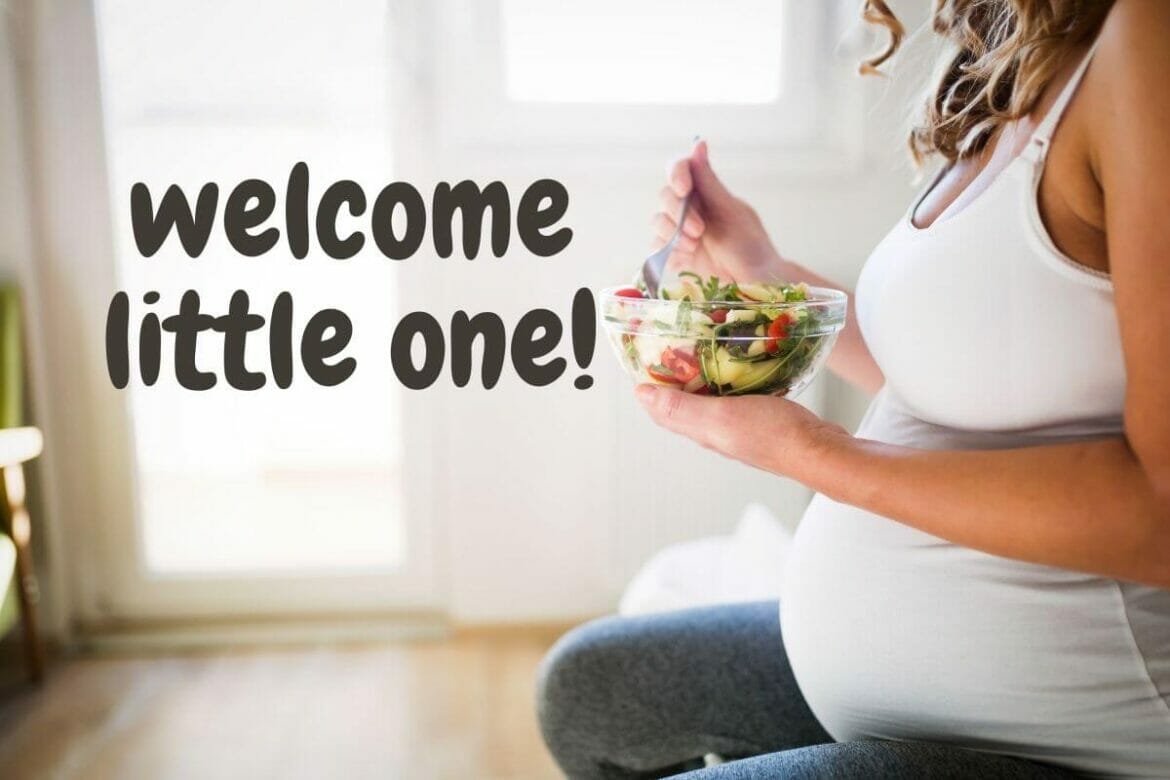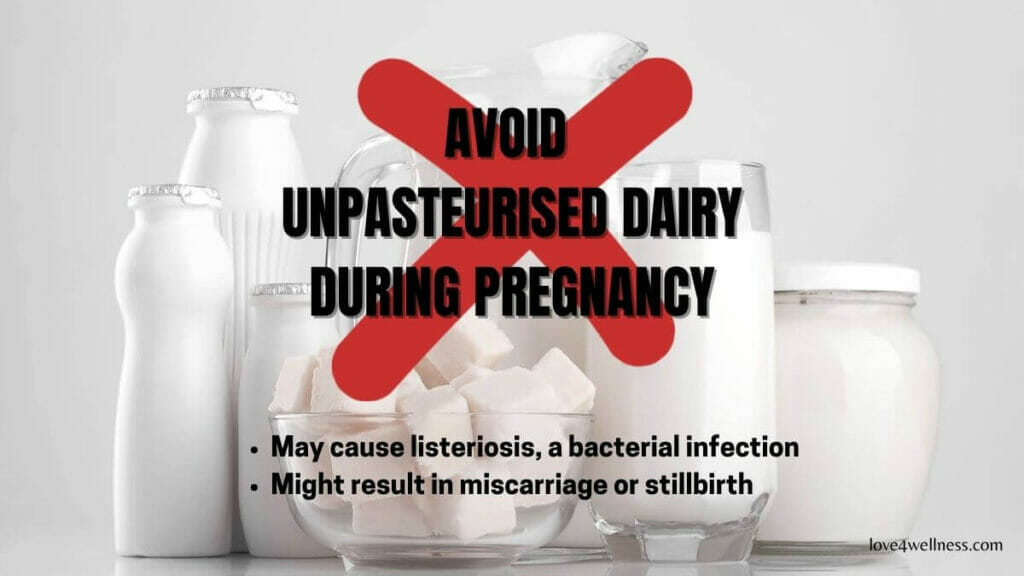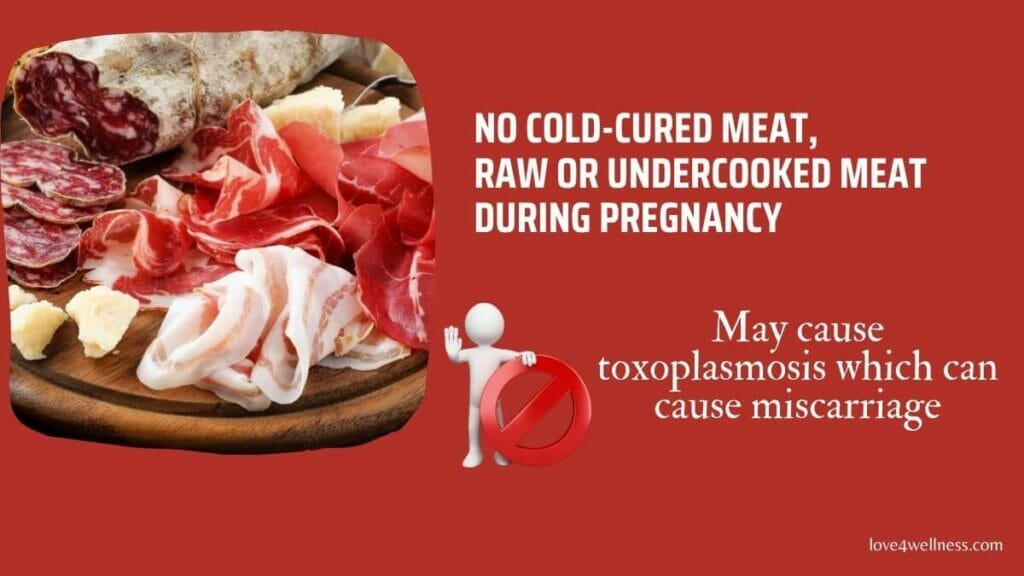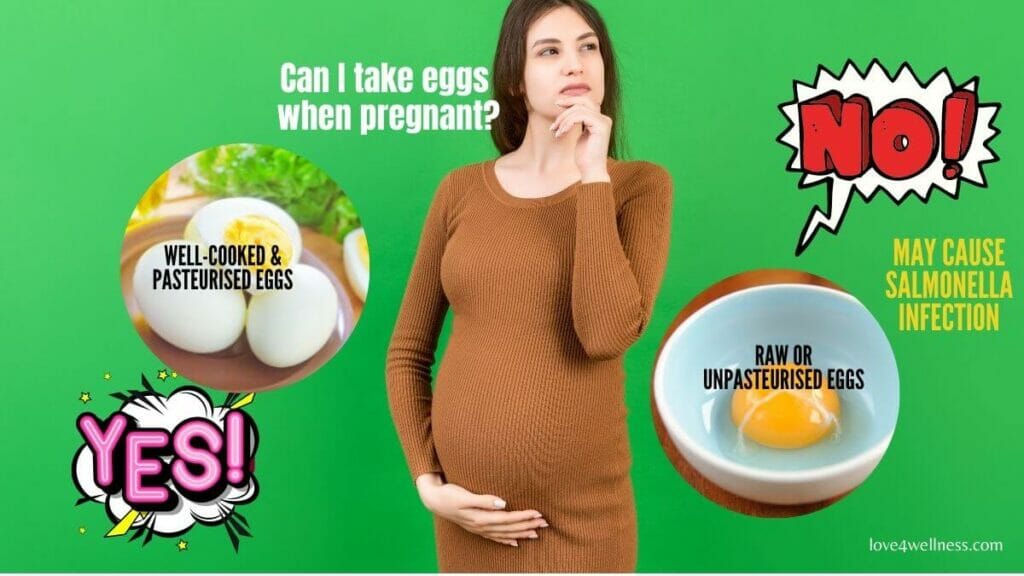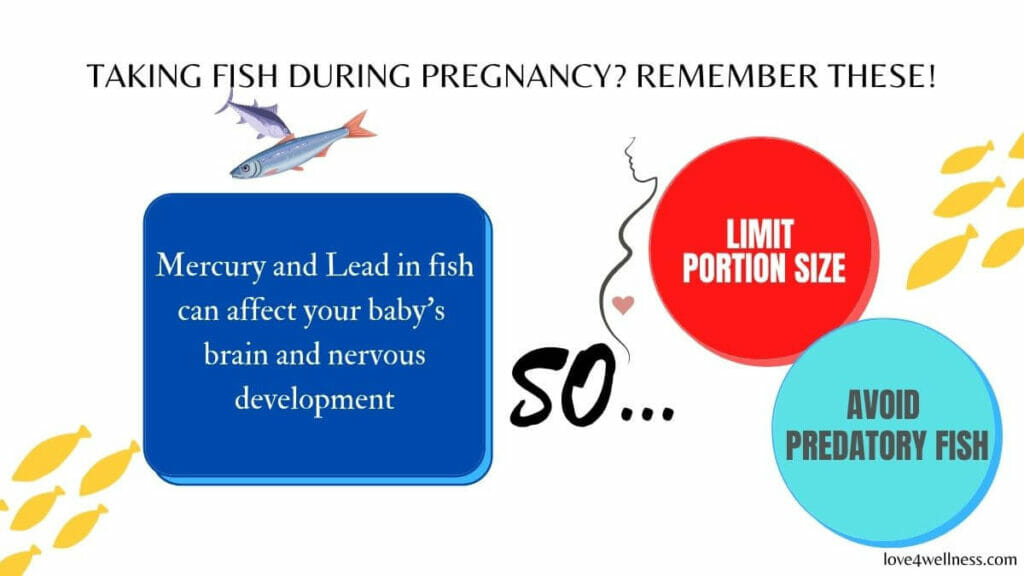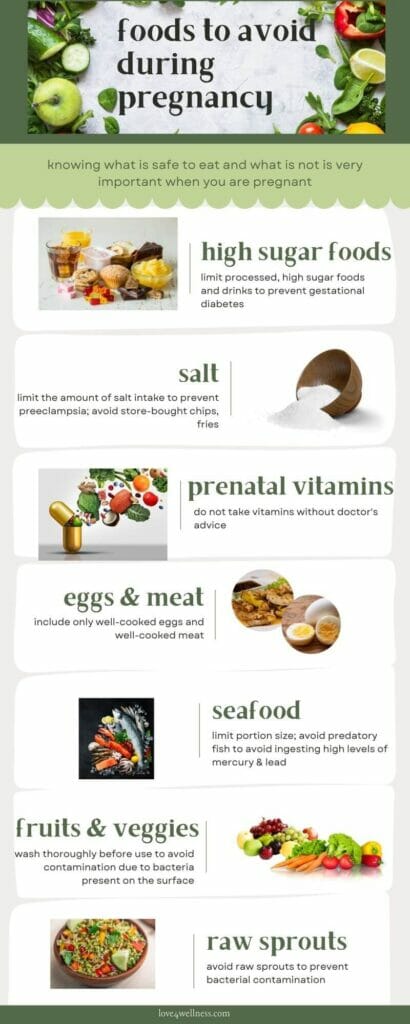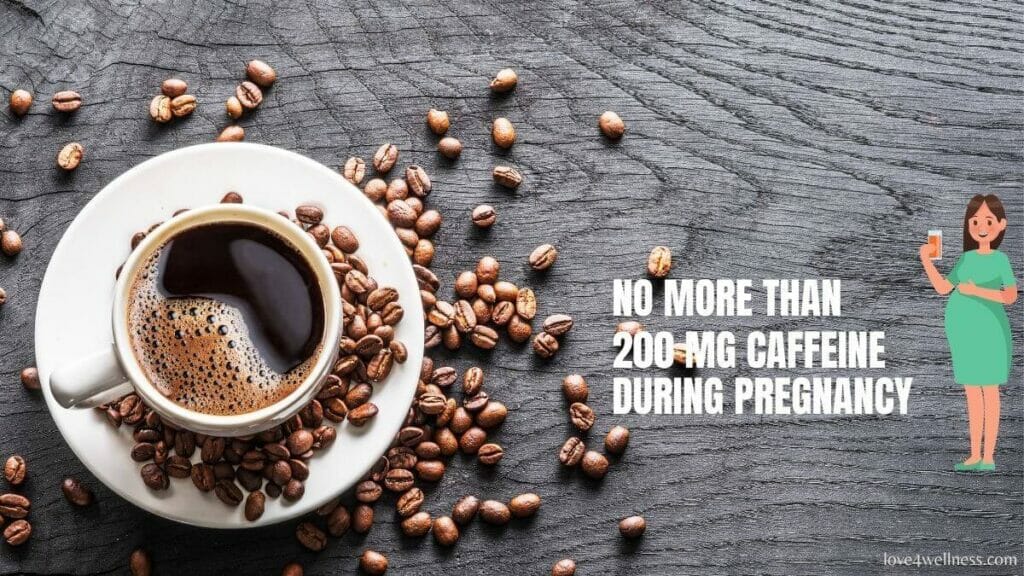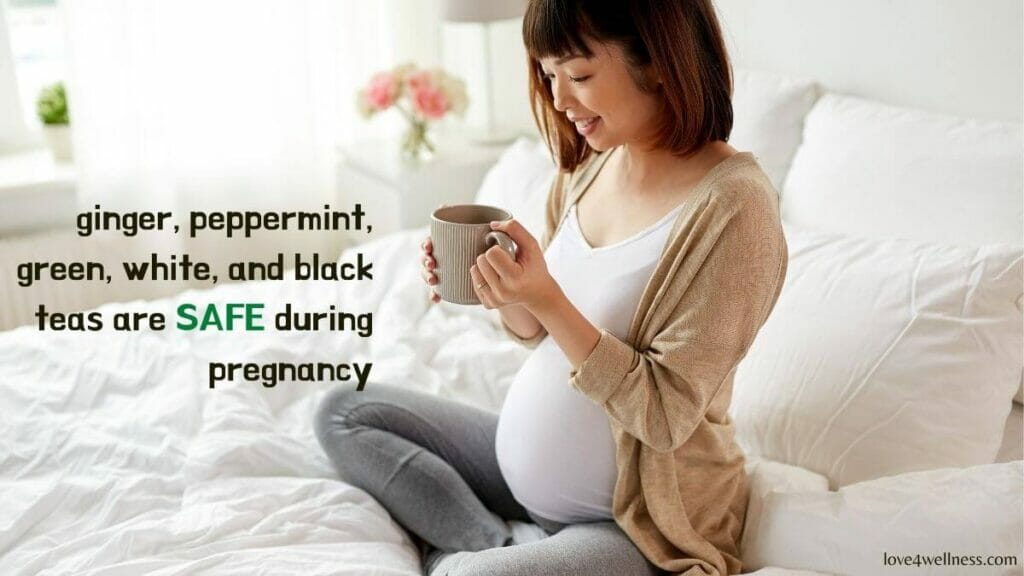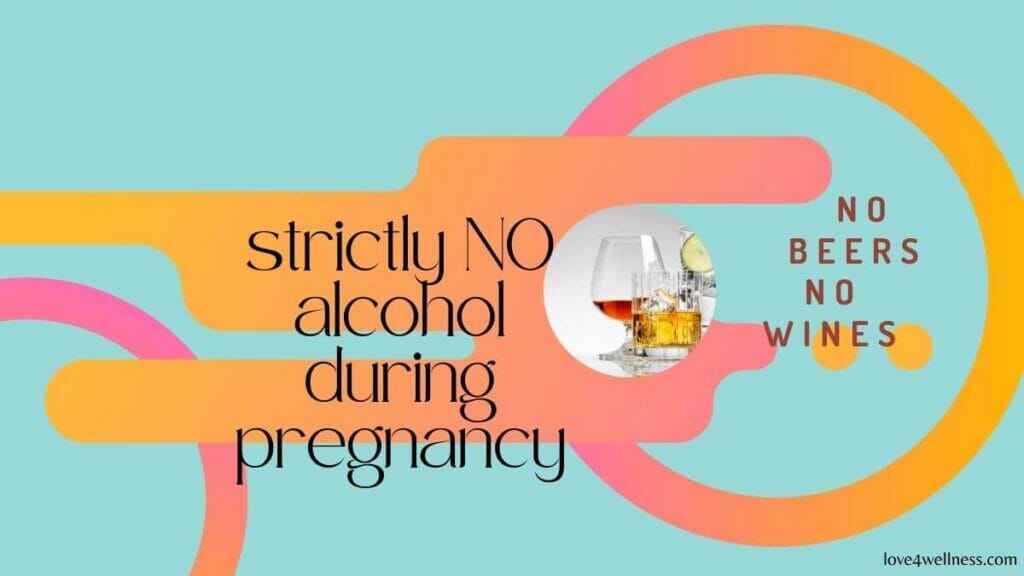When you are pregnant, there is a multitude of things you need to take care of. Food is one among them. Too much of some food can be harmful. Some foods themselves can cause harm. And some can cause food-borne infections. Hence, knowing foods to avoid during pregnancy and the precautions to take on quantity and cooking method becomes way too important!
Congratulations! You are pregnant. The chances are high that you are bombarded with an equal number of advice as those of wishes! Of course, you are about to welcome a little human being and people around you are excited and concerned as you are.
Now, take a deep breath. I know it is overwhelming. But, be assured things are going to be fine.
As you will agree, food is a crucial aspect of healthy living. When your little one is inside your tummy, the importance of food becomes higher. So how do you ensure your baby has a healthy and safe stay inside?
While it is essential to educate yourself on the foods to include, it is also important to know what foods to avoid or limit during pregnancy and what precautions you must take while cooking your food. It is all about safety during pregnancy because food poisoning can cause more harm to the unborn baby.
In this article, you will know the foods to avoid or limit during pregnancy and WHY. Here we go!
Foods to avoid or limit while you are pregnant
1. Dairy
Dairy products are generally safe, but you should avoid some groups, such as,
- mould-ripened soft cheeses that have a white coating on the outside, such as chevre, brie, and camembert (unless cooked steaming hot)
- soft blue cheeses such as Danish blue, Roquefort, and Gorgonzola (unless cooked steaming hot)
- unpasteurised cows’ milk/goats’ milk/sheep’s milk
- any foods made from unpasteurised milk, such as soft goats’ cheese
Why avoid?
Unpasteurised dairy products may contain listeria, which can cause an infection (listeriosis) that might lead to miscarriage or stillbirth. Besides, soft cheeses with a white coating on the outside tend to have more moisture, making it easier for bacteria to grow.
2. Meat
Cold cured meat such as salami, pepperoni, chorizo and prosciutto should be consumed with caution unless cooked thoroughly. And, it is best to avoid foods like raw or undercooked meat, all types of pâté, including vegetarian pâté, liver and liver products, and game meats such as goose, partridge or pheasant during pregnancy.
Why do you need to be cautious?
There is a risk of getting toxoplasmosis if you eat raw and undercooked meat, which can cause miscarriage. Cured meats are not cooked, which means they may have parasites in them that cause toxoplasmosis. Also, while micronutrients are necessary, too much of them can cause harm. Liver and liver products have significant vitamin A, and hence you must not consume them in large quantities. Game meats may contain lead shots, and an elevated lead might hurt the baby’s brain, kidneys, and nervous system. It may also cause the baby to be born too early or too small. High lead content in your blood might cause miscarriage as well if you are in your early pregnancy.
3. Eggs
Eggs are a superfood, and no denying including them in your diet during pregnancy. Well-cooked or pasteurised eggs are completely safe. At the same time, during pregnancy, you must avoid raw eggs in foods such as homemade mayonnaise, mousse, or cake batter.
Why?
Eggs might carry bacteria such as Salmonella. A salmonella infection might cause several gastrointestinal symptoms such as diarrhoea and vomiting, and you would require hospital care.
4. Fish
Fish is considered an excellent food choice for the baby’s growth and development due to omega-3-fatty acids, protein, iron, vitamin D, and vitamin B12. However, you must take care of the portion sizes and the type of fish you eat so that you don’t ingest too much of heavy metals present in fish, such as mercury and lead.
Pregnant women must limit oily fish such as salmon, trout, mackerel, or herring to two portions per week, about 340gms. Further, you must restrict the portion size of Tuna to not more than two tuna steaks or four medium-sized cans of tuna per week. It would be best to avoid foods containing predatory fish such as swordfish, marlin, shark and king mackerel during pregnancy.
Why?
If you are pregnant or planning to get pregnant, you must definitely watch your seafood intake as they may contain heavy metals such as lead, mercury, arsenic, and cadmium. High mercury or lead content in seafood can hamper your baby’s brain and nervous system development. Further, oily fish might contain pollutants such as dioxins and polychlorinated biphenyls that can affect neurodevelopment in the child.
Infographic on Foods to avoid during pregnancy:
5. Fruits, vegetables, and raw sprouts
I hear you! What can possibly go wrong with taking fruits and veggies, you ask? While fruits and vegetables are not foods to avoid during pregnancy, contaminated fruits and vegetables are.
Fruits, veggies and salads are a great source of various beneficial vitamins and minerals, but do you know they can be contaminated with harmful bacteria? And, hence, washing them well before consumption becomes paramount, particularly when you have them raw.
Further, it would be best to avoid raw sprouts such as alfalfa, clover, radish, chickpea, and mung beans because bacteria such as Salmonella on the surface can get through cracks in the seeds before the sprouts are grown. Such sprouts are contaminated with bacteria and must not be eaten raw. Instead, you can have cooked or pasteurised sprouts.
Why?
Inadequate washing of vegetables and fruits might cause an illness called toxoplasma that is harmful both to the mom-to-be and the unborn baby. Toxoplasmosis might cause hearing loss, blindness, and intellectual disabilities in the child. Further, food poisoning from raw sprouts might cause gastrointestinal disorders.
Food contamination is one of the major concerns during pregnancy as it might lead to miscarriage, stillbirth or premature delivery.
Tweet
6. Vitamin supplements
It’s a thumb rule; you must not take vitamins without performing blood tests and without a doctor’s prescription.
Why?
While vitamins and minerals are absolutely important during pregnancy, you must also remember that excess supplements is harmful. For example, too much vitamin A is toxic and can harm your liver or cause birth defects in the newborn.
7. High sugar foods
High sugar foods is on the top list to avoid during pregnancy. It is good to avoid high sugar foods such as,
- sugar-sweetened beverages
- flavoured coffee drinks
- sweetened breakfast cereals
- soda drinks
- honey (moderate amounts is fine)
- maple syrup
- packaged snack foods
- sweets
- cakes
- dried fruits (moderate amounts is advised)
- fruit juices, instead, consume whole fruits
Why?
High sugar foods are high in empty calories and can lead to gestational diabetes for pregnant women at risk.
8. Salt
Though it is always good to limit salt intake in anyone, it is particularly advised for pregnant women at risk for preeclampsia.
Preeclampsia is a condition that occurs only during pregnancy. Some symptoms include high blood pressure and protein in the urine, usually occurring after week 20 of pregnancy. Preeclampsia often precludes gestational hypertension.
Foods to avoid that are in high salt content include,
- salty snacks
- fries
- processed meats high in salt and saturated fats (ham, sausages, hot dogs, pepperoni, beef jerky, deli meats, roast beef and turkey)
9. Caffeine
Coffee lovers, watch out! More than 200 mg of caffeine per day is a no-no during pregnancy. Here is a list of caffeine content in certain products to give you an idea of what you can safely consume:
- A cup of instant coffee (100 mg)
- A mug of tea (75 mg)
- A can of cola (40 mg)
- 250 ml can of energy drink (80mg)
Why?
High caffeine intake might cause miscarriage, preterm birth and low birth weight.
10. Herbal teas
Herbal teas are refreshing and calming, yet it is good to avoid some of them when pregnant. Ginger and peppermint and, of course, black, white and green teas are safe, though, so you can satisfy yourself with those in moderate amounts.
Herbal teas to avoid:
- liquorice
- anise
- black cohosh
- ginseng
- kava
- sage
- parsley
- rosehip
- hibiscus
- mugwort
- lemongrass
And, this is not a complete list. So, always ask your healthcare provider before taking herbal tea during pregnancy.
Why avoid?
Certain teas might lead to an upset stomach, miscarriage, or preterm birth.
11. Alcohol
Alcohol also tops the list of foods and drinks to avoid during pregnancy. No alcohol, including wines and beers, is safe during pregnancy. If you are pregnant or trying to get pregnant, it is best to avoid alcohol.
Why?
Alcohol use can cause miscarriage and stillbirth. Further, alcohol in a pregnant woman’s blood passes to the baby through the umbilical cord that might cause FASDs (Fetal Alcohol Spectrum Disorders). These are physical, behavioural, and intellectual disabilities that can affect the child lifelong. The disabilities include,
- abnormal facial features
- small head size
- shorter than average height
- low body weight
- poor coordination
- hyperactive behaviour
- poor memory
- intellectual disability or low IQ
- speech and language delays
- problems with heart, kidney, or bones
- difficulty with attention
12. Elevated lead – watch out!
Elevated levels of lead contamination can lead to an increased risk of miscarriage, preterm delivery, problems in the baby’s brain, kidneys and nervous system.
Lead is found in glazed pottery, alternative medicine, some spices, drinking water in older houses, etc.
To prevent lead contamination,
- read labels
- check food products if their country of origin has a high lead content in their soil
- avoid the use of ceramic dishware for eating or preparing food
- avoid chipped or brightly coloured dishware
- eat a diet rich in calcium, iron and vitamin C
- opt for low-lead seafood
Wrapping up,
Following a healthy, diverse, and balanced diet is essential during pregnancy as well as preconception. Also crucial is knowing what is safe and what to avoid. Nevertheless, enjoy each day of this wonderful journey called pregnancy. Don’t feel overwhelmed. Pay attention to what you eat, and all will be well!
Edited by love4wellness | Images: canva.com
